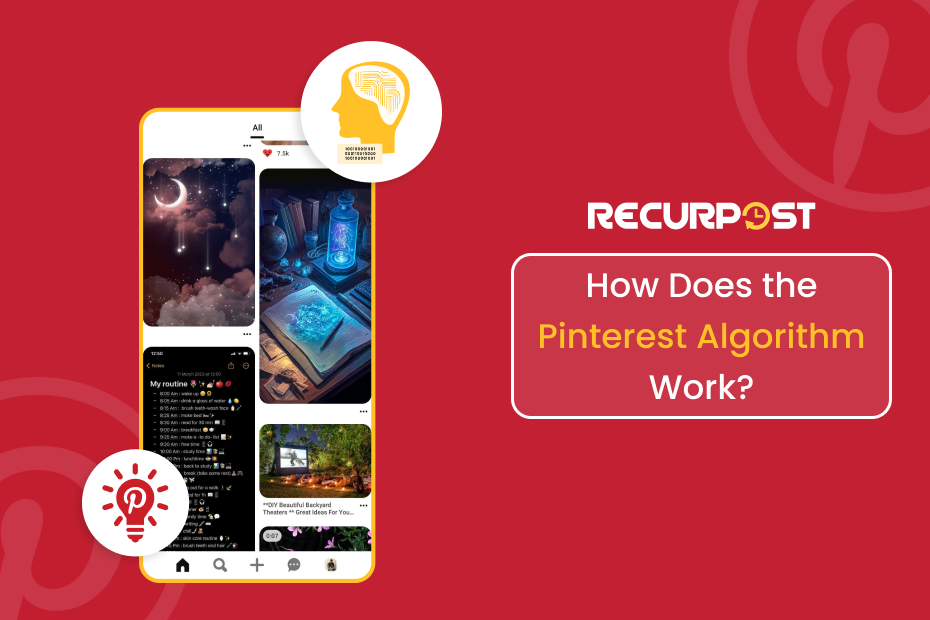Pinterest is not only just an idea platform but it is a visual discovery engine that bridges creativity and discovery. This is just like a notice board on which you can put your ideas about food, fashion, handicrafts, real estate- anything you can think of with various Pinterest pin dimensions! But with so many ideas, how do you make sure people see yours? That’s where the Pinterest algorithm comes in. It is like a smart organizer that determines which pins will appear for each person considering various factors.
The more you understand how the Pinterest algorithm works, the higher the chance the correct audience will see your pins. People may pay more attention to your site, they may be interested in your products, and even your sales may grow!
It’s time to study Pinterest’s algorithm and make sure your pins catch people’s attention.
Does Pinterest have an Algorithm?
Yes, Pinterest uses several algorithms to help users find content they’ll love. These algorithms work behind the scenes to make your Pinterest experience better. Let’s look at the three main types of algorithms Pinterest uses:
Pinterest Home Feed Algorithm
The Home Feed algorithm decides what Pins you see when you open the app or website. It looks at what you’ve liked, saved, or clicked on before. Then, it tries to show you more of the stuff you enjoy. This algorithm also considers what’s popular right now and what’s new on Pinterest.
Pinterest Search Algorithm
When you search for something on Pinterest, this algorithm goes to work. It tries to understand what you’re looking for and shows you the best results. The search algorithm looks at the words in your search, the text in Pins, and even what’s in the images. It also considers how popular and recent the Pins are.
Pinterest Ads Algorithm
This algorithm is all about showing you ads that you might actually like. It looks at your interests, what you’ve searched for, and the kinds of Pins you usually interact with. Then, it matches you with ads from businesses that fit those interests. The goal is to show you ads that are helpful and interesting to you.
How Does Pinterest Algorithm Work?
The Pinterest algorithm works by considering several factors to recommend the most relevant pins to users. These factors represent flags that Pinterest uses to recognize and estimate the quality and value of your pins and boards.
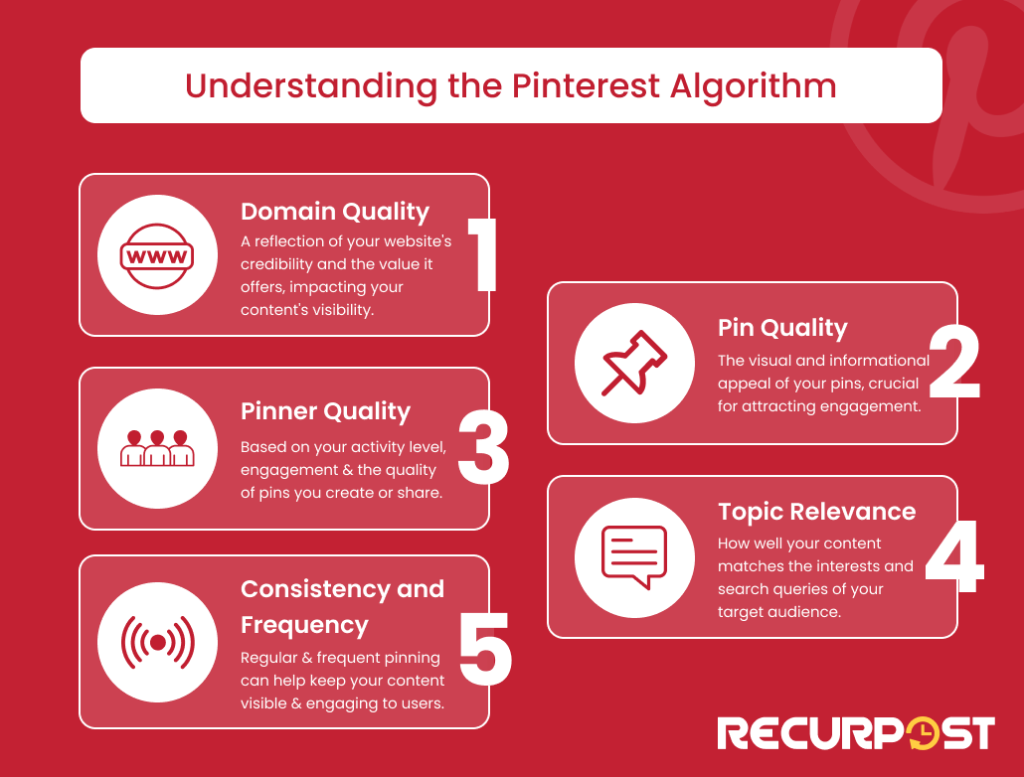
1. Domain Quality: Your Website’s Reputation
Pinterest wants to make sure it’s sending people to good websites. It checks if your website is verified (like showing you have the real deal), has links from other trusted sites to show it’s valuable, and works well on phones.
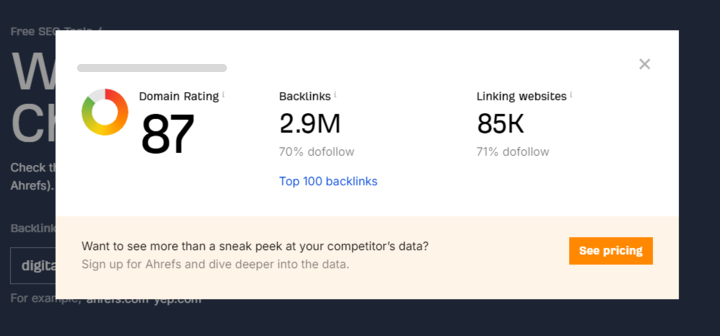
How to Improve: Verify your website with Pinterest to prove ownership. Remember creating good, trustworthy links is one of the best SEO techniques for getting your niche-specific website to be recognized by other respected websites. Make sure your website has a responsive design for convenient browsing on smartphones and tablets.
2. Pin Quality: Make it Attractive!
The better and more appealing your pin is visually, the more people will click it. Use images that grab attention, write descriptions that will spark curiosity, and be sure to provide content that matches your audience on Pinterest.

How to Improve: Make sure to use high-quality photos or well-designed graphics. Optimize your images’ aspect ratios for Pinterest. Craft compelling descriptions using relevant keywords that accurately describe your products or content.
3. Pinner Quality: Are You a Pinterest Pro?
Being active on Pinterest shows the algorithm you’re serious about. Pin regularly, build up your followers, and chat with people in the comments to show you care about the community.

How to Improve: Create and share valuable pins consistently. Engage with your audience and other users by liking, commenting, and replying to their posts. Engage in group boards around your niche.
4. Topic Relevance: What’s It All About?
Pinterest uses your description tag to figure out what your pin is about and shows it to the right people. If your pin is about baking cookies, make sure the description and keywords say that clearly!

How to Improve: Conduct keyword research to find what people are searching for on Pinterest. Use these keywords naturally in your pin descriptions, titles, and board names.
5. Consistency and Frequency: Keep it Fresh!
Regularly sharing new pins signals that you’ve got great content to offer. Pinterest loves fresh ideas, so keep the amazing pins coming!
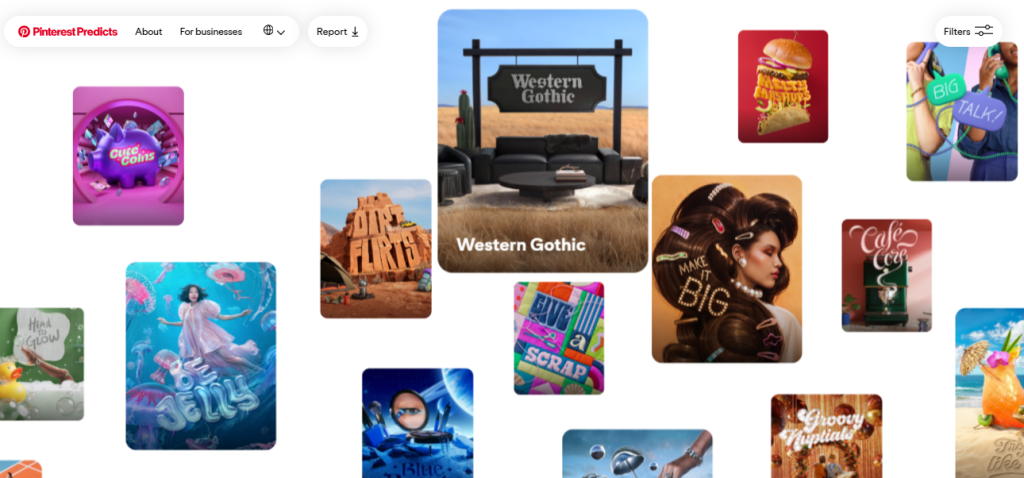
How to Improve: Use a Pinterest Scheduler to develop a regular pinning schedule and stick to it. Create multiple fresh, new pins each week. Don’t just repin old content – focus on offering new ideas and perspectives.
Key Factors Influencing the Algorithm
While the factors we discussed earlier lay the foundation for a strong Pinterest presence, several additional elements can significantly influence how the algorithm perceives and ranks your content. Let’s explore these key factors in more detail:
User Engagement: Do People Love It?
When people save your pins, click through to your website, view close-ups, or leave comments, it shows Pinterest that your content is worth highlighting.
Keyword Optimization: Speaking of Pinterest’s Language
Like Google, Pinterest has its own search engine. Do some keyword research to see what words people are already using when searching for something like your topic. Then, naturally include those keywords in your pin descriptions, titles, and board names.
Freshness of Content: New is Always Better
Pinterest loves seeing new activities. Create and share fresh pins regularly to show the algorithm that you’re an active content creator.
Social Signals: Popularity Matters
Getting repins, comments, and attracting new followers all indicate that people find your content valuable. Focus on creating share-worthy pins, and engage with your community to boost social signals.
Rich Pins & Pinterest Features: Unlock Extra Power
Rich pins give more information about a product rather than a regular one, for example, the price or ingredients of a recipe. Furthermore, Pinterest is constantly rolling out new features including Story Pins and Idea Pins. Try these formats to make your content more visible.
The topmost priority of Pinterest’s algorithm design is to precisely identify and optimize these key factors so that everything you post reaches the right audience at the right time.
Useful Strategies for Overcoming Pinterest Algorithm
Now that you have a clear idea about how Pinterest algorithms go, it’s high time you put this knowledge into practice. Here are some practical tips to optimize your Pinterest strategy:
1. Optimize for SEO: Think Like a Search Engine
Conduct keyword research using tools like Pinterest Trends or traditional keyword planners. Include relevant keywords in your pin titles, descriptions, board names, and even your profile bio.
2. Create High-Quality Visuals: Stand Out from the Crowd
Use clear, well-lit images or attention-grabbing graphics. Optimize your pin’s dimensions, Pinterest recommends a 2:3 aspect ratio. Ensure your pins are attractive and informative.
3. Engage with the Community: Be a Good Pinterest Citizen
Follow other accounts with similar interests. Join relevant group boards. Participate in discussions on other people’s pins. Consider hosting contests or giveaways to boost interaction.
4. Use Pinterest Analytics: Data is Your Friend
Pinterest’s inbuilt analytics will reveal the most popular pins and will even present you the insights on your audience. Use this data to adjust your content strategy and find what works best for you.
5. Leverage Pinterest Features: Embrace the New
Rich Pins provides extra details (product prices, recipes, etc.). Story Pins offer a multi-image format, and Idea Pins are great for tutorials and step-by-step content. Use these to boost engagement.
6. Schedule Pins: Consistency is Key
Tools like RecurPost help you maintain a regular pinning schedule. Consistency sends Pinterest a message that you are indeed a reliable and persistent content provider.
If you have any queries on scheduling pins, please refer to our blog which will help you understand how to schedule pins on Pinterest.
7. Create Fresh Content: Feed the Algorithm
Regularly introduce new pins. Keep your content timely by aligning with current trends or seasonal events.
8. Focus on User Experience: Put People First
Ensure your website is mobile-ready and responsive. If a visitor clicks your pin, the site should load quickly and be easy to navigate, offering helpful content.
These tips can serve you in achieving more by Pinterest’s algorithm, making your content more visible and having more engagement.
How to Reset Pinterest Algorithm?
If you want to reset the Pinterest algorithm to refresh your feed, follow these steps:
- Clear Search History: Go to your settings and clear your recent searches to remove past influences.
- Engage with New Content: Start searching for and saving pins in new categories and interests to guide the algorithm.
- Update Boards: Create new boards and add pins that align with your current interests.
- Unfollow Irrelevant Boards: Stop following boards that no longer interest you to help refocus your feed.
- Tune Your Home Feed: Next to your profile picture in the top-right corner, click the down arrow and select ‘Tune your Home Feed‘. Follow the instructions to gradually change your feed to better match your interests. Regularly tuning your feed helps maintain relevant content.
- Edit Personalization Settings: Adjust your personalization settings to refine your Pinterest experience. For more details, visit Edit Personalization Settings.
These actions will help Pinterest understand your new preferences and show you more relevant content.
Community Guidelines: Using Pinterest Responsibly
Pinterest has clear rules to maintain a fair and enjoyable experience for everyone. Here are some important guidelines:
- Avoid manipulating Pinterest algorithms or user traffic. This includes using fake accounts to boost your affiliate links or asking others to save or create Pins with your affiliate identifiers.
- Do not create repetitive or large volumes of affiliate Pins. Marketers should follow Pinterest’s spam policy and use affiliate links sparingly.
- Pinterest may remove, limit, or block content or accounts that violate these guidelines to ensure a healthy community environment.
For detailed guidelines, please visit Pinterest Community Guidelines.
Adapting to Algorithm Changes
Pinterest is one of the various social media platforms that frequently develop algorithms. To remain in the top position, it’s crucial to keep yourself informed and adjust your strategies accordingly.
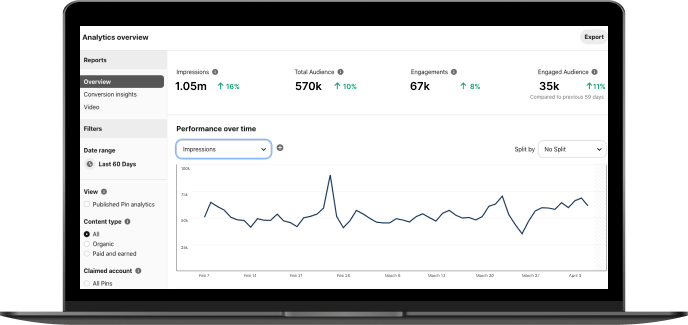
Strategies for Staying Updated
- Follow Industry Blogs: Many blogs specialize in Pinterest marketing and social media news. These resources often share insights into the latest algorithm changes.
- Join Groups: Facebook groups and Pinterest marketing forums are good resources for asking questions, sharing tips, and getting information about what is working for others.
- Webinars & Conferences: Attend virtual webinars and industry conferences where experts from the Pinterest community discuss the latest algorithm trends and best practices.
Importance of Reviewing & Adjusting
Don’t set your Pinterest strategy on autopilot. Review Pinterest analytics regularly to monitor performance changes. If your engagement dips after an algorithm update, it might be time to adjust your keyword strategy, pinning frequency, or type of content you share.
The Pinterest algorithm has been developed to improve the user’s experience on the platform. When you keep the quality of your content being the first prerogative, you are still in the game – even if the algorithm gets changed.
Conclusion
The Pinterest algorithm is your key to reaching the right audience and boosting your business. By focusing on quality content, optimizing for search, engaging with your community, and making use of Pinterest’s features, you can expect the following benefits:
- Get Seen: Increase visibility and reach more people.
- Spark Interest: Drive engagement with saves, clicks, and repins.
- Boost Traffic: Send more potential customers to your website.
- Grow Sales: Convert Pinterest inspiration into sales.
Remember, the algorithm is always evolving. Keeping up to date on the latest trends, getting hands-on, and of course, most importantly, making quality content that people crave.
This strategy is just one factor influencing Pinterest’s algorithm. For a deeper dive into social media algorithms, explore our guide: Social Media Algorithms Explained.
Frequently Asked Questions
Set up a target of pinning multiple times each day, nevertheless, concentrate on creating high-quality pins. Tools like RecurPost can help you post on Pinterest at the best times.
Rich Pins provides more information directly on the pin. Product Pins show pricing and availability, Recipe Pins show ingredients and cooking times, and Article Pins display the headline. To enable Rich Pins, apply on Pinterest’s website and validate your website’s code.
Pinterest has a built-in analytics dashboard that shows data such as impressions, clicks, saves, and audience demographics. Pay attention to which pins perform best and identify trends to inform your content creation and pinning schedule.
Make sure the keywords you are using are relevant and the ones that people use to search. Ensure that your pins look attractive with high-quality images and explanatory captions. Lastly, be sure that your site can be viewed easily on mobile devices, otherwise, by not having a strong mobile experience, your rankings in Pinterest can decrease.
The easy way is to stay connected with the Pinterest marketing community. Subscribe to blogs that are focused on Pinterest and join the relevant Facebook groups. Look for webinars and events organized by experts on Pinterest, where they discuss the algorithm updates and the best practices.
Even with the right keywords, ask yourself if your content is genuinely valuable to your target audience. Are you solving their problems or providing real inspiration? Also, be an active community member. Like, comment, and repin content from others. Consider experimenting with newer features like Idea Pins or Story Pins to see if they spark more engagement.
Pinterest has its own tool called Pinterest Trends. That shows you popular search terms. Watch for suggestions that pop up as you type in Pinterest’s search bar. You can even use traditional keyword research tools for additional insights.
To avoid burnout, start with one area at a time. Focus on improving your pin visuals or refining your keyword strategy. Use Pinterest’s built-in analytics to track which changes have the most positive impact. For consistent posting, consider a scheduling tool like RecurPost.

Saurabh Chaturvedi is a content writer at RecurPost. Specializing in social media management and marketing, Saurabh is dedicated to crafting engaging and informative articles. His passion for clear, exciting content keeps readers eager for more.
